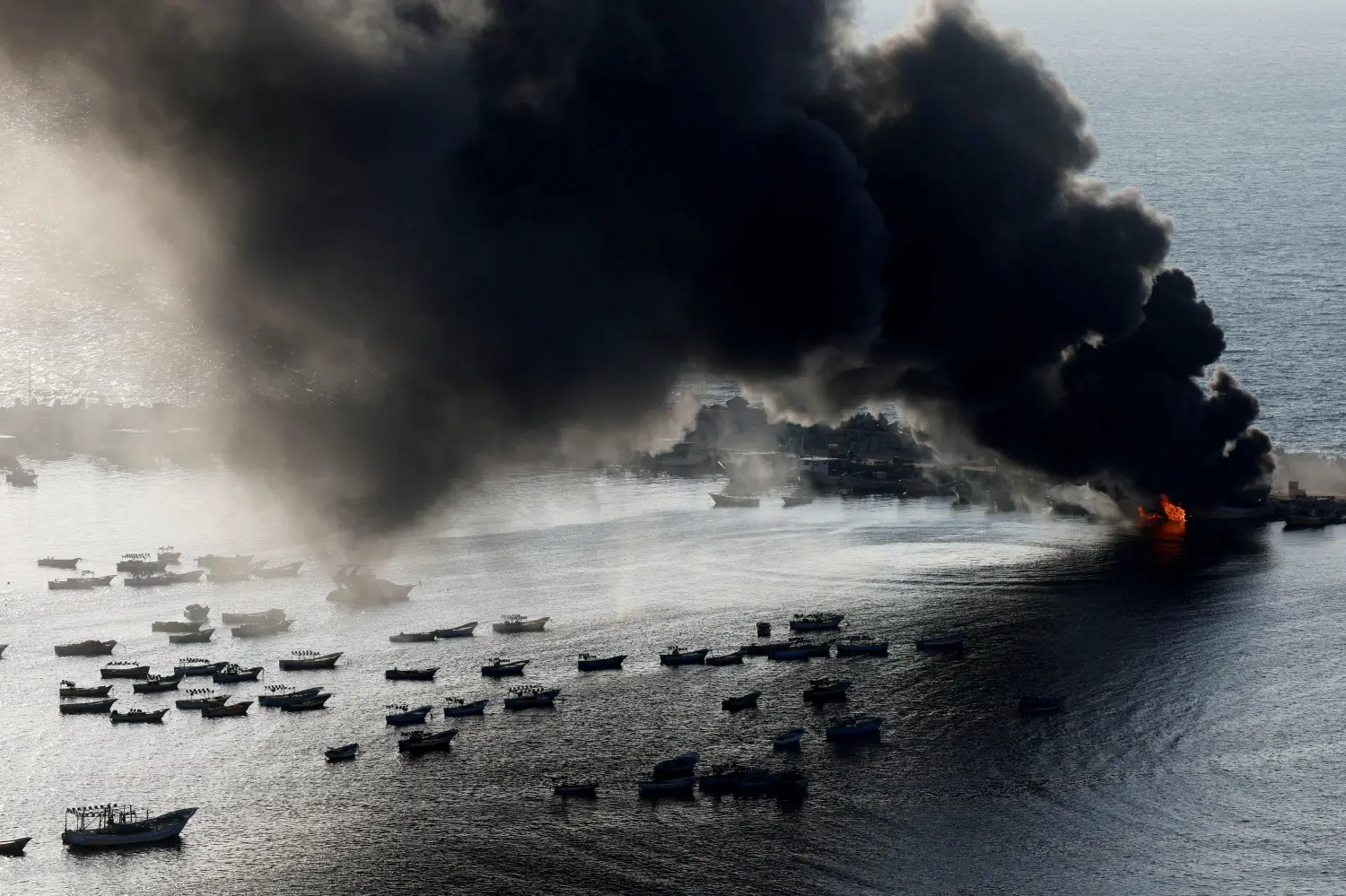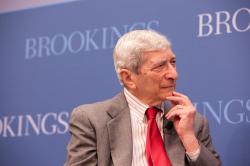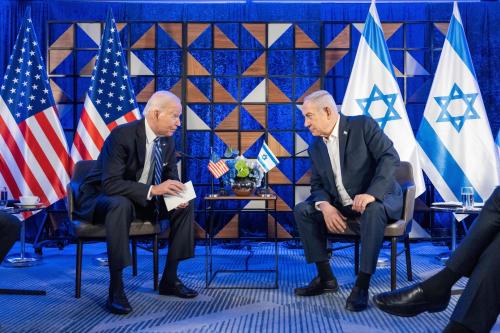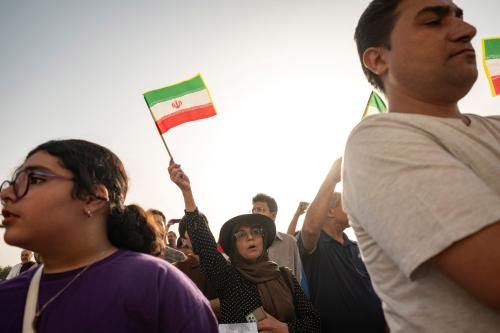Nearly six months after Hamas’s surprise attack on October 7 and Israel’s subsequent invasion of the Gaza Strip, Brookings scholars reflect on the conflict and humanitarian crisis.
Vanda Felbab-Brown
Hamas’s horrific terrorist attacks and Israel’s brutal, indiscriminate response in Gaza pose a challenge to the basic thrust of the Biden administration’s doctrine: to get the United States out of decades-long unending wars against nonstate armed actors, to get out of state-building efforts abroad, and to reorient U.S. security and military strategy toward great power competition with China and Russia.
With no good options, U.S. policy is now mired in an inflamed region where a wide range of Iranian proxy groups and nonstate armed actors are emboldened and reactivated by the war in Gaza. Hezbollah in Lebanon, the Houthis in Yemen, and pro-Iran paramilitary groups in Iraq all have been able to exploit the war to divert domestic attention in their countries from their governance failings and unrestrained power ambitions and wrap themselves in a newly-resurrected externalized legitimacy. Their actions pose a wide set of threats to the United States, including its security and economic interests. The Houthis’ Red Sea attacks and the U.S. military’s efforts to thwart them further entangle the United States in the region.
Instead of reducing U.S. involvement in the Middle East as the Biden administration had sought, it now finds itself tending to the very type of threats from which it wanted to walk away. Furthermore, to an unprecedented degree, the developments in the Middle East have a potentially significant impact on U.S. domestic politics, President Joe Biden’s reelection prospects, and thus the course of U.S. democracy during the next administration as angered Muslim-American communities threaten not to cast their vote for Biden.
Jeffrey Feltman
Hezbollah and Israel’s deadly, cross-border exchanges since October 7 have not yet escalated into full-scale war. The risks are acute, should Israel preemptively try to eliminate Hezbollah’s arsenals or either side miscalculate with a mass-casualty strike. Self-restraint is not typically associated with Hezbollah, but it seems to have guided the group’s actions and probably stems from two calculations.
The first is to avoid wasting Hezbollah’s 150,000-200,000 rockets and missiles. These weapons serve as Iran’s deterrence or second-strike capability against Israel. The Israel-Hamas war and cross-border exchanges have not crossed the threshold into what Iran would define as an existential threat necessitating the unleashing of Hezbollah’s weaponry across Israel.
A distant second in Hezbollah’s calculations is Lebanese public opinion. Lebanon’s Sunnis and Christians oppose entering a regional war. While Hezbollah can reliably count on most Shiites for any decision it takes (or Iran orders), alienating other Lebanese by igniting a war would undermine Hezbollah’s posturing as part of a cross-confessional alliance acting in Lebanon’s best interests.
Contrast Hezbollah’s post-October 7 posture with the Houthis’ attacks on Red Sea shipping. Houthi weaponry can be deployed without diminishing Iran’s deterrence. Houthi legitimacy among Yemen’s solidly pro-Palestinian population is enhanced via attacks defined as punishing Israel.
For decades, Iran has heavily invested in Hezbollah. But the looser, more deniable, less expensive Houthi relationship appears more immediately useful and less risky for Tehran in the aftermath of October 7. In the financial world, some banks are deemed “too big to fail.” In Iran’s “axis of resistance,” Hezbollah’s arsenals may have become “too big to use,” short of what the Iranians would interpret as an existential threat. An Israeli decision to destroy Hezbollah’s arsenals would likely fall into that definition, whereas U.S. attempts to take out Houthi strike capabilities have not.
Sharan Grewal
Six months in, Israeli forces have killed 33,000 Palestinians, approximately 70 percent of whom have been women and children, according to the Gazan Ministry of Health. The International Court of Justice said it is “plausible” these acts amount to genocide, while U.N. officials allege a variety of war crimes and “clear violations of international humanitarian law.” President Joe Biden himself has acknowledged that Israel’s campaign has been “over the top” and “indiscriminate.” Yet he continues to support it through billions of dollars in military aid and weapons transfers. Former Senator Patrick Leahy claims this continued military assistance to Israel runs afoul of the Leahy Law, which bars aid to units that have committed “gross violations of human rights.” Josh Paul and Annelle Sheline, who resigned in protest from the State Department, claim the Biden administration is aware of these violations but ignores them. That hypocrisy, and that blank check in support of Israel’s campaign, has tarnished America’s image worldwide and has emboldened Israel to act with impunity. It is long past time the United States respect its own laws. Biden should suspend military aid and sales of offensive weapons to Israel until it lifts restrictions on humanitarian assistance and significantly decreases civilian casualties.
Steven Heydemann
In the months prior to October 7, the Arab states, Turkey, and Iran had begun to put in place the elements of a post-pax-Americana security architecture to manage, if not resolve, long-standing sources of regional conflict and friction. Saudi Arabia and Iran renewed diplomatic ties. The leaders of Egypt and Turkey took steps to dampen their mutual antagonism. Arab states began normalizing ties with regional pariah Syria. Israeli-Arab normalization was also progressing. Prospects for expanding the Abraham Accords to include Saudi Arabia appeared positive. Whether seen as welcome or not, these trends represented a significant shift in regional dynamics.
Six months after Hamas’s murderous rampage on October 7 and the onset of Israel’s brutal, scorched-earth offensive in the Gaza Strip, these dynamics have proven surprisingly robust. Along virtually every axis, the ties that began to take shape before the conflict have persisted. In some cases, they have deepened. Arab normalization with Syria continues despite its failure to produce a change in the Assad regime’s conduct. In February, a meeting between Presidents Recep Tayyip Erdoğan and Abdel Fattah El-Sisi in Cairo was widely characterized as marking the end of “decades of diplomatic rancor.” Saudi-Iranian rapprochement continues. Saudi-Israeli normalization is on hold, but Riyadh has made clear its continuing interest in reaching some form of accommodation with Tel Aviv. Other Arab states that normalized relations with Israel remain committed to the Abraham Accords, even as relations with Israel become increasingly strained.
The apparent stability of this regional bridge building is still tentative, and its effectiveness is uncertain: the Israel-Hamas war may yet reignite underlying regional conflicts. It is also unclear how a regional security framework might influence the prospects for an independent Palestine. October 7 and its bloody aftermath have not been sufficient to compel Arab states to risk normalization with Israel over Palestine. Whether it might yet do so seems increasingly unlikely.
Marvin Kalb
Since October 7, the “two-state solution” has enjoyed a rebirth of hope and energy, but it may all be an illusion.
Ever since the late 1930s, diplomats have struggled to come up with a “live and let live” formula satisfying to the two parties, Israelis and Palestinians, currently sharing a small, inflamed sliver of the Middle East. The two-state solution is one such formula.
President Joe Biden has not only resurrected this formula; he’s made it his principal diplomatic goal. The success or failure of his efforts to end the war and ease the humanitarian crisis in the Gaza Strip could have a profound effect on his reelection prospects. Other American presidents have tried and succeeded: Richard Nixon got interim agreements; Jimmy Carter achieved the Israeli-Egyptian peace agreement. Biden may also register meaningful advances. But he knows this is an elusive goal, burdened by wars, old hates, dark suspicions, and a history of failed promises. For every step forward, there seems always to be two steps back, if not three.
In addition, at this time, Israeli Prime Minister Benjamin Netanyahu has opposed a two-state solution, especially after the October 7 tragedy, and Hamas has opposed not only a two-state solution but also Israel’s existence.
This is not the first time diplomats have dug into their file cabinets for Middle East peace formulas, such as the two-state solution. But only when individual leaders rise above the noise, such as Egypt’s Anwar Sadat in 1979, has historic progress ever truly been registered.
Patricia M. Kim
Contrary to the anticipation that China could emerge as a new Middle East powerbroker after it helped facilitate the restoration of relations between Saudi Arabia and Iran last year, Beijing’s track record since October 7 suggests such expectations were overblown.
While Chinese Foreign Minister Wang Yi has exchanged calls with his Middle Eastern counterparts and emphasized that “China is a good friend and brother of Arab and Islamic countries,” Beijing’s involvement in the crisis has remained relatively light. China’s position paper on the conflict called for a cease-fire, the protection of civilians, and diplomatic mediation toward a two-state solution, while also making clear that Beijing would not play a key role in advancing any of these priorities. Gone are any references to China’s willingness to host peace talks between Israelis and Palestinians, an offer Wang extended to both sides as recently as last April.
Instead, Beijing has been content to blame Washington for obstructing peace at the United Nations and promoting a narrative that U.S. interventions in the Middle East and its “biased” support for Israel are responsible for the chaos in the region.
Beijing sees no benefit in deeply involving itself in the Israel-Hamas war or the expanding regional instability associated with the conflict, such as in the Red Sea. Despite its growing economic and diplomatic footprint in the Middle East, the region remains relatively distant in the minds of most Chinese. And barring the development of direct threats to China’s security interests, Beijing will likely seek to remain above the fray while offering rhetorical support for peace.
Tanvi Madan
Over the last six months, India has continued its initial approach of condemning the terrorist attacks—albeit without naming Hamas—supporting Israeli’s right to respond, calling for the release of hostages, and showing solidarity with Israelis.
At the same time, India’s frustration with the nature of Israel’s response has become evident. In his second call with Israeli Prime Minister Benjamin Netanyahu, Indian Prime Minister Narendra Modi noted the need for humanitarian aid and “an early and peaceful resolution of the conflict.” After abstaining on a U.N. General Assembly resolution that called for a humanitarian truce in October, India voted for a resolution in December calling for an immediate humanitarian cease-fire (and the unconditional release of hostages).
Indian Foreign Minister Subrahmanyam Jaishankar has been blunter about India’s concerns, stating in February that Israel “should have been very mindful of civilian casualties” and more recently stressing “the underlying issue of the rights of the Palestinians and the fact that they have been denied their homeland.” India has also reiterated that a two-state solution is not only necessary but “urgent.” Jaishankar also met with his Palestinian counterpart a few months after Modi spoke with Palestinian leader Mahmoud Abbas, while Indian National Security Advisor Ajit Doval has visited Israel.
India’s balancing act reflects its different interests at play: relationships with Israelis, Palestinians, the Gulf Arab states, and Iran; concerns about the strategic and economic fallout of the Russia-Ukraine and Israel-Gaza crises; and the desire not to be outflanked by China in the Global South. Its navy has been active in combating threats to maritime security from both the Houthis and piracy that have put Indian trade and citizens at risk. The government also has to consider the safety of its citizens in Israel, particularly after the killing of an Indian worker (though more are heading there). Given these “pulls and pressures,” as Jaishankar put it, it’s not surprising that India is trying to contribute to a resolution to the crisis.
Suzanne Maloney
The Hamas massacres on October 7 and Israel’s subsequent invasion of the Gaza Strip have victimized, traumatized, and displaced both peoples in profound and enduring ways. After the largest loss of Jewish lives since the Holocaust and with 130 Israelis still held hostage, the security imperatives underlying Israel’s all-out war on Hamas still command wide public support in Israel. However, six months of bombardment have failed to eliminate Hamas or deter rocket attacks from Hezbollah, while precipitating massive Palestinian casualties and a humanitarian catastrophe in Gaza. The crisis has strained Israel’s creeping normalization with its Arab neighbors, escalated hostilities by Iran-backed militant groups, and generated recriminations against Israel around the world.
At the heart of this quagmire lies the Islamic Republic of Iran, which shares Hamas’s commitment to Israel’s destruction and provided the funding, training, and materiel support that made October 7 possible. Tehran has exploited and escalated the bloodshed in Israel and Gaza to elevate its stature, weaken and delegitimize Israel, undermine American interests, and shape the regional environment to its advantage.
For the Biden administration, the Israel-Hamas war upended determined efforts to pivot away from the Middle East. As the conflict has extended and expanded, so too has American diplomatic and military engagement to support Israel’s campaign, protect maritime transit, degrade regional militias, assist besieged Palestinian civilians, and establish conditions for a more stable postwar order. But on all but the first of those objectives, the U.S. track record to date is woefully inadequate. The result is a mounting strategic catastrophe, wrapped in a multitude of human tragedies, with a side of domestic political fallout for President Joe Biden in a monumental election year.
Allison Minor
When Houthi attacks in the Red Sea began in November, analysts were shocked that a relatively minor regional player could disrupt a waterway that carries 30 percent of global container traffic.
Several months later, a new normal has set in. Houthi attacks persist and major shipping companies continue to boycott the Red Sea in favor of much longer and costlier routes. International efforts have averted more catastrophic damage to ships but have not deterred the Houthis or reassured major shippers. As I discussed during a Brookings panel, the Houthis are likely to pose an enduring threat to freedom of navigation even after a cease-fire in the Gaza Strip, unless the international community can mount a unified effort to constrain Houthi behavior and address the factors inside Yemen that helped drive the Houthis’ attacks.
The long-term implications of this “new normal” may be greater than the immediate consequences for global commerce and regional instability. The attacks have demonstrated that even more minor revisionist groups can threaten freedom of navigation, especially when leveraging new weapons technology. More importantly, they underscore the difficulty of mounting an effective international response. Despite facing direct attacks and indirect economic consequences, China has taken almost no action against the Houthis’ attacks. China’s inaction underscores that major powers are unwilling to come together to defend immediate threats to global goods. China may calculate that the benefits such threats provide in strategic competition against the United States outweigh the costs, setting a concerning precedent for the future of major power competition and global goods.1
Bruce Riedel
The Zaydi Shiite Houthi rebels’ attacks on shipping in the Red Sea around the Bab el-Mandab Strait have produced little physical damage but a major impact on international shipping traffic. One ship has been sunk by the Houthis’ missiles and drones and several others damaged. But traffic through the Red Sea and the Suez Canal fell by 50 percent after the Houthis began firing at vessels in the waterways, according to the International Monetary Fund. While Houthi drone strikes on southern Israel have been easily shot down, maritime traffic to the Port of Eilat has declined by 85 percent.
American and British airstrikes on Houthi targets in Yemen have had little or no impact on the shipping companies who have diverted traffic to the much longer sail around Africa to get materials from Europe to Asia and back. This route takes weeks longer to move product than the Red Sea-Suez route. However, shipping owners prefer lower insurance rates for their vessels.
Egypt’s economy has been damaged by the Houthis’ attacks as Cairo depends on tolls for the traffic through the canal for foreign capital. Tourism is also down due to the Israel-Hamas war which hurts Egypt, Israel, and Jordan.
The Houthis say they will halt their attacks when a lasting cease-fire comes to the Gaza Strip. The Houthis have long been rhetorically hostile to Israel but the attacks since October mark the first time this militia has targeted Israel directly. The Houthis are using the attacks to rally popular support in Yemen to their political benefit. Washington should make a cease-fire its top priority for many reasons, including to end the attacks in the Red Sea and Yemen.
Natan Sachs
The horrors of the past six months, from the invasion of some 2,000 Hamas fighters into Israel and the historic massacre of October 7, to the staggering and ongoing civilian death toll and physical destruction in the Gaza Strip during the Israeli operation there, have exacerbated a latent disconnect in Middle East policy. Before October 7, the region’s geopolitical fundamentals pointed toward new alliances, including Israeli-Arab integration, which, as Steven Heydemann writes, remain robust. However, the Palestinian issue, mostly neglected in prior integration efforts, has returned as a central public political motivation in the region and far beyond. The Palestinian issue is now more salient in public opinion than it has been in decades, with publics in the Middle East and much of the world adopting it—or sometimes a simplistic image of it—as an element of their own political identities.
Israeli-Saudi normalization was a key element of the Biden administration’s regional strategy prior to this war. The Netanyahu government, which was very keen on a Saudi opening, remains hopeful of such a move today, even as it recklessly neglects laying the basic groundwork for a livable “day after.” Should a cease-fire be reached soon that frees Israeli hostages and allows desperately needed relief to enter Gaza, Gulf involvement might become a possibility again. However, even partial Saudi-Israeli rapprochement will now have to address the Palestinian issue head-on, not only in Gaza but also in the West Bank. Only if some of the worst trends in the West Bank—an inept and corrupt Palestinian Authority, the expansion of settlements’ jurisdiction, and violence against Palestinian civilians, for example—are arrested and reversed might a reformed Palestinian Authority be rehabilitated among its own public and be able to offer an alternative to the Islamist actors, such as Hamas, which is bent on continuing the war for years to come.
Valerie Wirtschafter
In response to controversial comments comparing Israeli military actions in the Gaza Strip to the Holocaust, Brazil’s president, Luiz Inácio Lula da Silva, was declared unwelcome in Israel until he issued a retraction. This dispute in February 2024 stands in stark contrast to the Israeli response to previous, more measured criticism from Brazil’s foreign policy establishment. In 2014, following a critique of its military activity in Gaza, an Israeli spokesperson dismissed Brazilian concerns, calling the world’s seventh-largest country “a diplomatic dwarf.” A decade later, Israel’s response highlights both the relative weight and more polarizing and assertive tone of Brazil’s current foreign policy agenda.
Over the past 10 years, however, Brazilian politics has changed dramatically, shaped in part by a swelling Evangelical population. Although this socially conservative demographic swung toward Jair Bolsonaro in the 2022 presidential election, Lula has sought to placate Evangelical voters or at least not overtly draw their wrath. Lula’s remarks on Israel have upset this delicate balancing act, and his approval ratings dropped considerably. This own goal may have been a lifeline to a seemingly hobbled, anti-democratic movement spearheaded by Bolsonaro: donning Brazilian and Israeli flags, demonstrators turned out en masse in late February to rally around the former president, who is now under multiple federal investigations. As Brazil’s G20 agenda continues to take shape, Brazil’s leadership would be wise to return to a more constructive, diplomatic approach meant to facilitate dialogue rather than exacerbate it—both democratic governance in Brazil and Brazil’s important voice in international politics will benefit.
-
Footnotes
- The author is currently a visiting fellow at Brookings on leave without pay from the U.S. State Department. The views expressed in this article are the author’s own.
The Brookings Institution is committed to quality, independence, and impact.
We are supported by a diverse array of funders. In line with our values and policies, each Brookings publication represents the sole views of its author(s).




















Commentary
6 months on: What is the impact of the war in Gaza?
Brookings experts reflect on the conflict
April 5, 2024